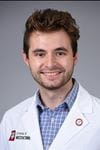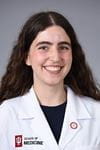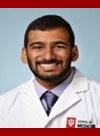MS1
 Undergraduate Institution: University of Wisconsin-Eau Claire
Undergraduate Institution: University of Wisconsin-Eau Claire
Research: As an undergraduate researcher, I used molecular dynamics simulations to analyze SAR-CoV-2 spike protein binding kinetics and compare the strength of protein interaction networks among several virus variants. After graduating, I joined a transplant immunology lab focused on advancing therapeutics for kidney transplant recipients and improving graft survival and function through novel methods of immunosuppression. I worked on multiple projects investigating the efficacy of antibody and cellular-based therapies involving CAR-T cells, myeloid-derived suppressor cells, and xenotransplantation in nonhuman primate and murine models. Currently, I’m interested in continuing research within immunology. I hope to investigate methods of immunomodulation further to enhance patient treatment options and health outcomes.
 Undergraduate Institution: Purdue University
Undergraduate Institution: Purdue University
Research: As an undergraduate, my research involved modeling the different growth kinetics of various bacteria commonly found in the human gut microbiome on several carbohydrate sources. After graduating, I studied the impact of gut microbiome manipulation on proteolytic activity in a humanized mouse model of post-infection irritable bowel syndrome. Broadly, I am interested in future translational work through the manipulation of the microbiome to change gastrointestinal or infectious disease outcomes.
 Undergraduate Institution: Fordham University
Undergraduate Institution: Fordham University
Research: My undergraduate research focused on culture and cognitive aging in East Harlem, NYC. I was trained in community-based participatory research as we studied how HIV affects the brains of aging ethnoculturally diverse older adults. After graduating, I earned my MA in Ethics and Society, specializing in bioethics and health sciences. I also began a lab manager position, and our lab grew to include several NIH/NIA-funded research studies focused on recruiting and engaging underrepresented populations in dementia research. I now hope to further my sociomedical and behavioral research skills in the field of Alzheimer’s Disease and Related Dementias (ADRD) so that I may contribute to scientifically rigorous and ethically responsible research and medical practice.
 Undergraduate Institution: Gonzaga University
Undergraduate Institution: Gonzaga University
Research: While at Gonzaga University, I researched the chemical signals of a newly discovered salamander species. This stimulated my broader interest in marine wildlife and ecology, leading me to research marine ecosystems in the Galápagos Islands. However, after reflecting on my time in the clinic as an undergraduate, I sought to shift my research to more directly benefit human health, guiding me to Merck after getting my degree. Here, I investigated potential drug targets for retinal diseases and the mechanisms of photoreceptor support in retinal pigment epithelial cells. This fostered my interest in the underlying mechanisms of age-related vision loss and neurodegenerative disorders. As an MSTP student and future physician-scientist, I hope to understand these pathologies more deeply through my research and investigate potential avenues for therapeutic intervention.
 Undergraduate Institution: University of Alabama at Birmingham
Undergraduate Institution: University of Alabama at Birmingham
Research: As an undergraduate, I eagerly pursued various neuroscience research opportunities, ranging from basic wet lab research on tau pathology in Parkinson’s disease to clinical research on stroke in advanced heart failure patients and functional MRI research on cognitive aging and brain network connectivity. The latter sparked my specific interest in clinical neuroimaging research, leading me to a two-year postbaccalaureate research fellowship at the National Institute on Aging. During this fellowship, I conducted advanced quantitative MRI research on changes in cerebral white matter associated with aging and dementia. As an aspiring physician-scientist, I aim to apply multimodal neuroimaging to develop advanced imaging biomarkers for Alzheimer’s disease and related dementias. My goal is to facilitate early diagnosis and inform personalized treatment strategies for these neurological conditions.
 Undergraduate Institution: Southeastern University
Undergraduate Institution: Southeastern University
Research: I researched O-GlcNAcylation, a post-translational modification similar to phosphorylation, with Dr. Aimee Franklin. I worked on validating a mouse model knocking down O-GlcNAc levels and studying sex differences in O-GlcNAc expression in the hippocampus. I also interned at Penn State with Dr. Yongsoo Kim during undergrad and studied the 5xFAD mouse model of Alzheimer’s and the use of the Barnes maze to validate spatial memory deficits in this model. Following graduation, I spent two years at the National Institute of Mental Health working with Dr. Ted Usdin, conducting a microscopic anatomy study of the nucleus accumbens in mice and developing new microscopic imaging protocols. I am interested in pursuing neurology and Alzheimer’s disease research and the intersection of this disease with social determinants of health.
 Undergraduate Institution: University of California San Diego
Undergraduate Institution: University of California San Diego
Research: My research has focused on neuropsychiatric disorders and neurological diseases, from pre-clinical to clinical levels of investigation. During my undergraduate years, I completed projects on the underlying neurobiological mechanisms of seasonally induced bipolar disorder on mice models. In addition, I was also involved in another project that examines the neuropsychological and neurophysiological effects of pro-cognitive drugs in patients with schizophrenia using experimental medicine paradigms. After UCSD, I transitioned to Massachusetts General Hospital (MGH), where my clinical research concentrated on sleep abnormalities and circadian dysregulation in patients with Parkinson’s Disease and its prodrome, REM Sleep Behavior Disorder. I also experienced conducting multisite national clinical trials and international observational and longitudinal research studies at MGH. As a future physician-scientist, I hope to conduct research on the translational neuroscience of sleep abnormalities in relation to psychiatric disorders and neurodegenerative diseases.
 Undergraduate Institution: University of Michigan
Undergraduate Institution: University of Michigan
Research: As an undergraduate, my research primarily focused on isolating and characterizing cancer-derived extracellular vesicles using novel microfluidic devices. I also acquired device design and development experience using photolithography techniques to fabricate hydrogel-covered silicon microneedles as well as a micron-scale flow meter. In addition to university research, I also gained industry experience during internships in both the renewable energy and pharmaceutical fields. My current research interests lie in drug delivery, specifically the targeting of organs using nanoparticles.
 Undergraduate Institution: University of Illinois at Urbana-Champaign
Undergraduate Institution: University of Illinois at Urbana-Champaign
Research: I was involved in several research projects during my undergraduate years. I first worked in a lab developing 3D placental tissue models to study trophoblast invasion during early development, utilizing different techniques such as microfluidic organoid fabrication and live cell tracking. My later projects were more computational, namely studying spatial transcriptomics in mammalian tissue and simulating bacterial growth using an agent-based model. These different projects have given me a strong foundation in biology, mathematics, and computer science; I plan to utilize these skills to study neurological conditions such as Alzheimer's disease and related dementias. I am primarily interested in the potential for next-generation sequencing and microscopy techniques to uncover the underlying mechanisms of ADRD.
MS2
 Undergraduate Institution: Indiana University Purdue University Indianapolis
Undergraduate Institution: Indiana University Purdue University Indianapolis
Research: As an undergraduate, I researched in Indianapolis and Ecuador on medical anthropological topics such as medical pluralism, demographic transition, and explanatory frameworks of chronic illness. I have also worked as a research coordinator on an NIEHS-funded interdisciplinary project through Purdue University on volatile organic compound exposure in a rural Indiana town. These experiences fostered a desire to perform rigorous scholarship in social science and medicine in a mutually informative way. However, I hope to focus and apply my research to topics such as gerontology and Alzheimer’s Disease and Related Dementias (ADRD).
 Undergraduate Institution: Hanover College
Undergraduate Institution: Hanover College
Research: My undergraduate research involved validation of a transgenic zebrafish model for tissue-specific induction of proinflammatory cytokines in pancreatic beta cells. After graduating college in 2022, I continued to participate in research focused on beta cell dysfunction in the context of Type 1 Diabetes. During that time, I was involved in projects investigating several potential biomarkers of T1D. Generally, I am interested in studying the underlying mechanisms that contribute to beta-cell dysfunction in pediatric patients with Type 1 and Type 2 Diabetes. I hope to apply these interests toward contributing to the overall understanding of diabetes so that we may find ways to mitigate the adversity disadvantaged populations face when trying to manage this disease.
 Undergraduate Institution: Washington University in St. Louis
Undergraduate Institution: Washington University in St. Louis
Research: As an undergraduate, I worked on two clinical studies – investigating the impacts of limb-restraint therapy in children with cerebral palsy on somatosensory processing and helping to create a quality-of-life scale specific to GNAO1 encephalopathy. Following my undergraduate education, I studied the immune response against S. aureus infections in children, focusing on understanding the mechanisms of protective immunity against recurrent infection. Broadly, I am interested in combining my research interests in neuroscience and immunology to study the role of the neuroimmune response in neurodegenerative diseases.
 Undergraduate Institution: University of Maryland Eastern Shore
Undergraduate Institution: University of Maryland Eastern Shore
Research: As an undergraduate, I worked in multiple labs dedicated to the environmental influences on health, the information that could be discovered about solute transport, and diabetes using the Zebrafish and organic solutions to pest control. After graduating I spent three years as a Post-baccalaureate Mishoe Fellow at the NHLBI/NIH where my work shifted to the study of the crosstalk and development of the sympathetic nervous system and the vascular system in mice. I am interested in continuing work with integrative clinical neuroscience and the crosstalk between the nervous system and other biological systems.
 Undergraduate Institution: Purdue University
Undergraduate Institution: Purdue University
Research: My undergraduate research explored the biomechanics of and manufacturing interventions for impact sports, mobile healthcare interventions for patients with chronic kidney disease, and implantable biosensor development in adhesive hydrogels and antifouling mechanisms. I have previous industry experience in orthopedic device quality engineering and vascular intervention research and development. My research interests lie in nephrology interventions, dialysis devices, and acute kidney injury therapeutics. Additionally, I participate in the Crossroads Pediatric Device Consortium, contributing to pediatric device development and translation. As a prospective physician-scientist, I aim to positively impact renal patients by developing my research, engineering, and medicine skills.
 Undergraduate Institution: Indiana University Purdue University Indianapolis
Undergraduate Institution: Indiana University Purdue University Indianapolis
Research: My undergraduate research focused on elucidating the underlying mechanisms and risk factors, such as the apolipoprotein E genotype, contributing to long-term neurocognitive impairments in children with severe forms of plasmodium falciparum malaria. This led me to focus on determining potential reliable, non-invasive prognostic biomarkers of acute brain injury within the context of Ugandan children with severe malaria. In parallel, I have also worked with a zebrafish model of fetal alcohol spectrum disorder, centered on determining the rescuing effects of folic acid and retinoic acid following embryonic ethanol exposure. Broadly, I am interested in continuing research within global health and infectious disease, focusing on understanding the mechanisms involved in clinical neurological manifestations and brain injury. I hope to become a physician-scientist who will develop therapeutics and interventions to enhance patients’ lives globally.
GS1
 Undergraduate Institution: The University of Alabama
Undergraduate Institution: The University of AlabamaGraduate Department: Biochemistry and Molecular Biology
Research Mentor: Carmella Evans-Molina, MD, PhD
Research: My research focuses on the pathophysiology of Type 2 Diabetes, particularly identifying changes in the transcriptome and calcium homeostasis that contribute to metabolic dysfunction.
 Undergraduate Institution: Brigham Young University
Undergraduate Institution: Brigham Young University
Graduate Department: Biomedical Engineering (Purdue University)
Research Mentor: Sherry Harbin, PhD
Research: I currently work in a collaborative environment with Dr. Harbin and otolaryngologist Dr. Stacey Halum to develop a regenerative construct to combat tracheal stenosis. Dr. Harbin has developed a non-immunogenic biomaterial that demonstrates capability of regenerating cartilage in the larynx, and we hope to leverage this material to prevent and treat the scar down and cartilage degeneration that causes airway collapse following tracheostomy.
 Undergraduate Institution: Indiana University
Undergraduate Institution: Indiana University
Graduate Department: Biomedical Engineering
Research Mentor: Elsje Pienaar, PhD
Research: I am broadly interested in mechanistic modeling of biological systems, including collective cell dynamics and cell-environment interactions. My current research is focused on agent-based modeling of the immune response in non-tuberculous mycobacteria infections and pediatric HIV. As an aspiring physician-scientist, I am interested in applying computational tools to study disease progression and treatment, working towards precision medicine based on individual patients’ disease patterns and data.
 Undergraduate Institution: Case Western Reserve University
Undergraduate Institution: Case Western Reserve University
Graduate Department: Pharmacology and Toxicology
Research Mentor: Elizabeth Yeh, PhD
Research: As an undergraduate, my research focused on the role of iron in the pathogenesis of and relationship between ocular and neurodegenerative disorders. Now, I am working with Dr. Liz Yeh to understand the role of HUNK (hormonally upregulated Neu-associated kinase) in triple-negative breast cancer. HUNK is a relatively newly discovered kinase that has been shown to promote breast cancer tumor growth and metastasis in mouse models. Using spatial transcriptomics and proteomics on sections of mouse tumors, I will further explore the role of HUNK in triple-negative breast cancer and its interaction with the immune system and tumor microenvironment.
 Undergraduate Institution: Purdue University
Undergraduate Institution: Purdue UniversityGraduate Department: Medical and Molecular Genetics
Research Mentor: Jungsu Kim, PhD
Research: With a background in Neurobiology and Biochemistry, I am extremely interested in studying neurodegenerative diseases from a biochemical standpoint. Previously my research focused on studying the implication of the dysregulation of human deubiquitinate enzymes in neurodegenerative diseases and cancer. As a future physician-scientist, I hope to contribute to our understanding of the molecular mechanisms underlying neurodegeneration and advance our therapeutic strategies for neurologic disease.
 Undergraduate Institution: University of Kentucky
Undergraduate Institution: University of Kentucky
Graduate Department: Biochemistry and Molecular Biology
Research Mentor: Carmella Evans-Molina, MD, PhD
Research: I am interested in better understanding why the immune system attacks pancreatic beta cells in Type 1 Diabetes. My research focuses on how alterations in both lymphocytes and beta cells can contribute to the development of autoimmune diabetes, specifically focusing on calcium signaling. By pursuing this research, I hope to contribute to a better understanding of mechanisms of diabetes development that can be exploited to prevent and treat this disease.
 Undergraduate Institution: University of Illinois at Urbana-Champaign
Undergraduate Institution: University of Illinois at Urbana-Champaign
Graduate Department: Medical Neuroscience
Research Mentor: Jungsu Kim, PhD
Research: My previous research has focused on fetal neurodevelopment in the context of maternal immune activation and the gut microbiome, which have been epidemiologically linked to autistic and schizophrenia-like behavior in offspring. I have also performed research on the brain-gut axis, focusing on the impact of dietary fiber on pro-inflammatory microglia in an aged mouse model. Currently, I study the role of neuroinflammation in Alzheimer's disease, and I hope to better elucidate its mechanism of pathology as well as develop potential therapeutics that can be brought to the patients' bedside.
 Undergraduate Institution: Purdue University
Undergraduate Institution: Purdue UniversityGraduate Department: Biomedical Engineering
Research Mentor: Matthew Ward, PhD
Research: Broadly, I am interested in continuing research to further the translational neural engineering field. I work on device development, biosignal processing, and parameter optimization for research into personalized neuromodulatory devices. My primary research interest is studying the effects of transcutaneous auricular vagus nerve stimulation in different disease states. I hope to learn and grow as a researcher, combining areas of engineering research with treating neurological diseases and disabilities.
 Undergraduate Institution: Cornell University
Undergraduate Institution: Cornell University
Graduate Department: Medical Neuroscience
Research Mentor: Brian Pierchala, PhD
Research: I'm interested in understanding the genetic pathways of motor neuron degeneration in amyotrophic lateral sclerosis (ALS). My research with Dr. Pierchala uses mouse models to study disease pathology and evaluate potential therapeutics. I'm excited to continue pursuing neuroscience from a genetic and molecular perspective with translational goals.
GS2
 Undergraduate Institution: Purdue University
Undergraduate Institution: Purdue University Graduate Department: Medical Neuroscience
Research Mentor: Jignesh Tailor, MD, PhD
 Undergraduate Institution: Washington University in St. Louis
Undergraduate Institution: Washington University in St. Louis
Graduate Department: Medical Neuroscience
Research Mentor: Jungsu Kim, PhD
Research: My interest lies in creating new model systems to study the human nervous system and disease. My previous research involved modeling neurodevelopmental differences in the disease Neurofibromatosis Type 1 (NF1) using in vitro human stem cell models of brain development. In my current lab I am bridging in vitro and in vivo models to understand how genetic influences in the immune system impact Alzheimer’s Disease pathology.
 Undergraduate Institution: University of Notre Dame
Undergraduate Institution: University of Notre Dame
Graduate Department: Medical Neuroscience
Research Mentor: Karen Pollok, PhD
Research: My research interests lie at the intersection of oncology, pediatrics, neuroscience, and immunology. I have experience in translational and clinical breast cancer and immunology research and am excited about targeted cancer therapeutics, tumor modeling and biobanking, neuro-oncology, and immunotherapies. I work in Dr. Karen Pollok’s lab, studying pediatric glioma, focusing on cancer signaling pathways, targeted therapeutics, and patient-derived xenograft models.
 Undergraduate Institution: University of Missouri-Columbia
Undergraduate Institution: University of Missouri-Columbia
Graduate Department: Biochemistry
Research Mentor: Mark Kelley, PhD
Research: My research is focused on characterizing the multifunctional protein APE1/Ref-1 and its role in cancer, specifically in pancreatic cancer. APE1/Ref-1 gets its two names from its two key functions: DNA repair and redox regulation. In its redox regulatory role, it has been shown to be overexpressed in multiple types of cancer and other diseases of chronic inflammation. My lab has generated APE1/Ref-1 specific inhibitors, which have undergone phase 1 clinical trials for pancreatic cancer. The focus is now on generating second and third-generation compounds which maintain the safety profile observed in the first round of trials while increasing the potency/efficacy of the effect observed.
 Undergraduate Institution: Purdue University
Undergraduate Institution: Purdue University
Graduate Department: Biomedical Engineering
Research Mentors: Kelvin Lee, MD and Xiaoping Bao, PhD (Purdue University)
Research: As an aspiring physician-scientist, I seek to bridge the gap that currently exists between the laboratory and the clinic in the field of hematological malignancies. My long-term research goals largely revolve around 1. understanding immune cell differentiation, 2. developing novel adoptive cellular therapies, and 3. targeting immuno-evasive mechanisms of cancer (especially Multiple Myeloma). I am currently under the mentorship of Dr. Kelvin Lee (current Director of IU Simon Comprehensive Cancer Center) and Dr. Xiaoping Bao (Professor of Chemical Engineering at Purdue University).
 Undergraduate Institution: Indiana University
Undergraduate Institution: Indiana University
Graduate Program: Anatomy, Cell Biology & Physiology
Research Mentor: Sharon Moe, MD
Research: My graduate research with Drs. Sharon Moe and Matt Allen is focused on musculoskeletal dysfunction in chronic kidney disease. I primarily study the effects of irisin, a myokine released during exercise, and its crosstalk with other molecules in osteocytes and in a CKD-MBD animal model. I also perform clinical research with the IU FIT-Core, investigating the intersection of muscle loss and weakness, bone quality/quantity, and physical performance in CKD. Secondary projects include exploring the effects of dietary choices such as fiber and meat intake on CKD outcomes.
 Undergraduate Institution: Indiana University
Undergraduate Institution: Indiana University
Graduate Department: Microbiology and Immunology
Research Mentor: Matthew Turner, MD, PhD
Research: I am interested in understanding the mechanisms of cutaneous cancer development and progression. My previous research with Dr. Matthew Turner focused on identifying differentially expressed genes in melanoma micro-metastases using spatial transcriptomics. We are investigating the underlying mechanisms linking these genes to disease evolution.
GS3
 Undergraduate Institution: Brigham Young University
Undergraduate Institution: Brigham Young University
Graduate Department: Biochemistry and Molecular Biology
Research Mentor: Amelia Linnemann, PhD
Research: My primary research interest is studying the mechanisms of autoimmune targeting of beta cells in Type 1 Diabetes. Particularly, I am interested in studying how defects in the autophagy pathway of beta cells alters the immunopeptidome presented to cytotoxic T cells.
 Undergraduate Institution: The Ohio State University
Undergraduate Institution: The Ohio State University
Graduate Department: Microbiology & Immunology
Research Mentor: Martin Richer, PhD
Contact Information: almocart@iu.edu
Research: With previous research experience in molecular biology, global public health, epidemiology, and clinical infectious diseases, I strive to combine these disciplines to study and counteract global emerging viral pathogens. For my dissertation I am investigating mechanisms of Zika virus immune evasion with the goal to ultimately improve our clinical understanding of Zika infection and provide developing nations with the knowledge to counteract Zika outbreaks.
 Undergraduate Institution: Stanford University
Undergraduate Institution: Stanford University
Graduate Department: Microbiology and Immunology
Research Mentor: Mark Kaplan, PhD
Research: My research focuses on the characterization of cell surface targets in hematological malignancies, primarily acute myeloid leukemia and multiple myeloma. I am working to delineate the mechanism of these target antigens which were identified using mass spectrometry and RNA sequencing. We hope to use these targets to develop and test chimeric antigen T cell receptor (CART) therapies and/or other T cell driven therapies such as bi-specific T cell engagers (BITE).
 Undergraduate Institution: North Park University
Undergraduate Institution: North Park UniversityGraduate Department: Medical and Molecular Genetics
Research Mentor: Karen Pollok, PhD
Research: My undergraduate research and publications focused on growing health awareness of dietary supplements derived from plants and marine sources. My current interests are in personalized medicine from studying human genes in different cancers. Pollok lab aims to build upon the standard-of-care therapy for sarcoma by modulation of dysregulated signaling networks and focuses on developing novel curative and maintenance therapies for pediatric sarcomas.
 Undergraduate Institution: Indiana University-Indianapolis
Undergraduate Institution: Indiana University-Indianapolis
Graduate Department: Medical Neuroscience
Research Mentor: Bruce Lamb, PhD
Research: My current research interests involve using mouse models and human data to better understand genetic contributions to Alzheimer's Disease (AD). Specifically, we are investigating novel variants of PLCG2, a phospholipase which, in the brain, is found exclusively in microglia and has important functions in immune receptor signaling and microglial activation in AD. This work could reveal novel targets for therapeutic intervention through up- or downregulation of PLCG2 in patients with AD.
 Undergraduate Institution: Washington University in St. Louis
Undergraduate Institution: Washington University in St. Louis
Graduate Department: Medical Neuroscience
Research Mentor: Leslie Hulvershorn, MD
Research: I am broadly interested in the neurobiological basis of psychiatric and addictive disorders. My current research utilizes neuroimaging to evaluate the brain basis for the development of risky drug use and sexual behaviors in adolescents.
 Undergraduate Institution: Earlham College
Undergraduate Institution: Earlham College
Graduate Department: Molecular & Medical Genetics
Research Mentor: Mateusz Opyrchal, MD, PhD
Research: My PhD work in Dr. Mateusz Opyrchal’s lab focuses on the identification of therapeutic targets for treating Triple Negative Breast Cancer. Specifically, we intend to exploit the immune defense mechanisms against cancer and to identify biological targets that may improve T-cell cytotoxicity towards solid tumors.
 Undergraduate Institution: Purdue University
Undergraduate Institution: Purdue University
Graduate Department: Medical and Molecular Genetics
Research Mentors: Wade Clapp, MD and Steven Rhodes, MD, PhD
Research: I have always been intrigued by molecular pathways’ role in the progression and metastasis of cancer. For my undergraduate thesis, I conducted pancreatic ductal adenocarcinoma research characterizing a signaling pathway receptor and molecular mutations contributing to malignancy. In my PhD research, I hope to continue identifying novel therapeutic targets in molecular pathways that can contribute to personalized treatment strategies and improved survival outcomes in cancer patients.
 Undergraduate Institution: Milwaukee School of Engineering
Undergraduate Institution: Milwaukee School of Engineering
Graduate Department: Biomedical Engineering
Research Mentors: Yunjie Tong, PhD (Purdue University) and Qiuting Wen, PhD (Indiana University)
Research: I am interested in researching functional imaging techniques to greater understand organ function in-vivo. I want to research the application of these imaging techniques so they can be used to detect organ dysfunction and disease progression. My goal is to combine my passion for both engineering and medicine to answer pertinent clinical questions.
GS4
 Undergraduate Institution: University of Colorado – Boulder
Undergraduate Institution: University of Colorado – Boulder
Graduate Department: Microbiology and Immunology
Research Mentor: Nathan W. Schmidt, PhD
Research: My graduate project looks to describe how the gut microbiome alters susceptibility to severe malaria in Ugandan children. I assess bacterial sequencing data, immune cell sequencing, and functional tests with mouse models to reveal the microbiome's impact on the immune system's ability to fight parasitic infections.
 Undergraduate Institution: Indiana University-Indianapolis
Undergraduate Institution: Indiana University-Indianapolis
Graduate Department: Microbiology and Immunology
Research Mentor: Rachel Katzenellenbogen, MD
Research: My research interests are focused on elucidating the cellular mechanisms involved in Human Papillomavirus (HPV) type 16 infections. HPV is responsible for a range of clinical manifestations and is the cause of nearly all cervical cancers; however, there are currently no therapeutics available that target the virus specifically. My research aims to understand how HPV 16 utilizes cellular machinery and alters gene expression to establish and maintain infection.
 Undergraduate Institution: Massachusetts Institute of Technology
Undergraduate Institution: Massachusetts Institute of TechnologyGraduate Department: NCI: Department of Oncology, University of Oxford
Research: My work evaluates the properties of myeloid cells in metastatic solid tumors which can exhibit dichotomous roles of immune surveillance or suppression. Through functional and transcriptional studies, I am evaluating various mechanisms involved in myeloid-tumor interactions. Ultimately, I seek to identify targets that can help reprogram the immune compartment of the tumor microenvironment and increase anti-tumor activity.
 Undergraduate Institution: Purdue University
Undergraduate Institution: Purdue UniversityGraduate Department: Biomedical Engineering
Research Mentors: Carmella Evans-Molina, MD, PhD (Indiana University) and Fang Huang, PhD (Purdue University)
Research: My research interests lie in diabetes, specifically in gaining a better understanding of how the pancreatic beta cells fail to try to slow or halt the progression of diabetes as well as create new therapeutics targeted at beta cell health. I am currently researching how estrogen may play a role in beta cell identity and function and how it may therefore contribute to the pathophysiology of type 2 diabetes. Additionally, I am applying super-resolution microscopy to the beta cell in order to characterize the ultrastructural architecture of the organelles of the β-cell under healthy and diabetic conditions to correlate the relationship between structure and function and potentially identify new treatment options for this disease that targets organelle health.
 Undergraduate Institution: Indiana University
Undergraduate Institution: Indiana University
Graduate Department: Medical Neuroscience
Research Mentor: AJ Baucum, PhD
Research: My prior research in Ken Mackie’s endocananbionid lab at IU Bloomington consisted of both basic (localizing endocannabinoid proteins FAAH and Crip1a) and applied science (investigating effects of perinatal exposure to WIN 55,212-2). This background has given me a driving curiosity to answer basic science questions and the motivation to export such findings from lab for clinical application. I am broadly focused on psychopathology with particular focus on mood disorders, autism, and addiction. In addressing these disorders I hope to contribute to the development of novel therapeutics as well as a growing of the fundamental cognitive processes (e.g. affective regulation, social cognition, motivational processes) that are aberrant in such disorders.
 Undergraduate Institution: Indiana University - Indianapolis
Undergraduate Institution: Indiana University - IndianapolisGraduate Department: Medical and Molecular Genetics
Research Mentor: Jason Meyer, PhD
Research: My prior research experiences have mostly centered around neuroscience, including the role of inflammatory pathways in depression, addiction, and traumatic brain injury. My current research involves modeling Alzheimer's Disease using an in vitro human stem cell model. Specifically, I am working to determine the impact of a single nucleotide variant in the CX3CR1 gene on microglia function and possible neurodegenerative effects related to Alzheimer's Disease.
GS5
 Undergraduate Institution: University of Pittsburgh
Undergraduate Institution: University of Pittsburgh
Graduate Department: Biomedical Engineering
Research Mentor: Michael Heinz, PhD
Research: I am utilizing my background in engineering, signal processing, and music to study the processing of pitch by the auditory system-- particularly in sensorineural hearing loss (SNHL). By leveraging controlled animal models of SNHL, I can better interpret our behavioral and electrophysiological findings in human listeners, hopefully leading to an improved understanding of pitch processing and better diagnostics and assistive technology.
 Undergraduate Institution: Rutgers University-New Brunswick
Undergraduate Institution: Rutgers University-New Brunswick
Graduate Department: Biochemistry and Molecular
Biology/Medical Neuroscience
Research Mentors: Amber Mosley, PhD and Jungsu Kim, PhD
Research: My undergraduate and post-undergraduate research focused on transcriptional and post-transcriptional regulation of different systems. My first lab experience focused on the effects of RNA-binding proteins on the development of the neocortex. Afterwards, I joined a bioinformatics lab focusing on the RNA translation of Dengue virus infected cells and, on a different project, colon cancer. I hope to integrate multi-omics (proteomics, transcriptomics, genomics) studying relevant genes and proteins to neurological diseases.
MS3
 Undergraduate Institution: University of Dayton
Undergraduate Institution: University of Dayton
Graduate Department: Medical Neuroscience
Research Mentor: David Kareken
Research: My current research interests center around functional reward circuitry imaging of the human brain and how it relates to common human vices.
 Undergraduate Institution: University of Michigan
Undergraduate Institution: University of Michigan
Graduate Department: Biomedical Engineering
Research Mentors: Jacqueline Linnes, PhD and Natalia Rodriguez, PhD (Purdue University)
Research: I am interested in designing methods and devices for the sustainable, scalable management of infectious diseases, particularly in resource-constrained environments. Many people suffer due to a lack of proper treatment for very preventable and/or treatable conditions (such as STIs, Cholera, respiratory infections etc…) while at the same time antibiotic resistance is becoming a formidable complication to treatment around the world. Accessible technologies for rapid, accurate screening and diagnosis allow health departments to mount effective responses, connecting patients to the right care. Much of the required technology for these tools already exists in hospital labs but require many resources like trained personnel, expensive equipment, highly processed samples, sterile conditions, and time. I am interested in adapting these technologies to make diagnostic and screening tools for health departments/ministries without these resources to still offer effective care to patients and populations dealing with infectious diseases.
 Undergraduate Institution: Bowdoin College
Undergraduate Institution: Bowdoin College
Graduate Department: Medical and Molecular Genetics
Research Mentor: Reuben Kapur, PhD
Research: I am interested in the factors driving cancer pathogenesis and the development of novel therapies. Previously, I investigated the mechanisms underlying the cancer predisposition syndrome neurofibromatosis type 2 (NF2) and developed potential therapies for NF2 patients with Dr. Long-Sheng Chang and Dr. D. Bradley Welling at Nationwide Children’s Hospital and The Ohio State University. Studying NF2 inspired an interest in the genetic alterations that influence cancer development and progression and the aspects that make each patient’s disease process unique. To further explore the factors that promote oncogenesis, I am conducting my graduate research in the lab of Dr. Reuben Kapur. Using genetically-engineered and transplant mouse models, I am investigating the contributions of inflammatory signaling pathways to leukemogenesis and exploring the possibility of targeting these pathways for therapeutic intervention.
 Undergraduate Institution: Indiana University-Bloomington
Undergraduate Institution: Indiana University-Bloomington
Graduate Department: Biochemistry and Molecular Biology
Research Mentor: Shannon Hawkins, MD, PhD
Research: Interested in pathologies of the female reproductive system, specifically, reproductive cancers. In my work with Dr. Hawkins, I plan to study ovarian cancer in models with concurrent endometriosis. Previously, my research focused on the effects of stress on the brain with a particular interest in sex difference of neuronal and microglial morphologies in the orbitofrontal cortex of Sprague Dawley rats. In my future career, I aspire to help determine better modalities for ovarian cancer detection, target treatments, and improvement in patient quality of life.
 Undergraduate Institution: Purdue University
Undergraduate Institution: Purdue University
Graduate Department: Medical and Molecular Genetics
Research Mentor: Kun Huang, PhD
Research: I am interested in experimental design, data science, biostatistics, and oncology. I want to organize clinical trials that take advantage of big data and machine learning technologies. My background is in translational research, focusing on pathogen detection in food systems. My current research is on histopathological image analysis for melanoma metastasis prediction and the use of transfer learning to map patient-level clinical characteristics onto cell-level data.
 Undergraduate Institution: Brigham Young University
Undergraduate Institution: Brigham Young UniversityGraduate Department: Biomedical Engineering
Research Mentor: Craig Goergen, PhD (Purdue University)
Research: My research interests and ambitions are to help the pediatric patient population by using cardiovascular imaging to better characterize the complex mechanisms of disease and pathology that underly heart conditions. Recently, I have been working with Dr. Larry Markham at Riley Children's Hospital to develop biomechanical and machine learning methods to detect and track cardiomyopathy progression in children with Duchenne muscular dystrophy using cardiac magnetic resonance imaging.
 Undergraduate Institution: Ithaca College
Undergraduate Institution: Ithaca College
Graduate Department: Medical Neuroscience
Research Mentor: Woody Hopf, PhD
Research: My work has established a rodent model for investigation of heart rate variability as a biomarker in alcohol use disorder. Heart Rate Variability, the beat-to-beat variation in time between heartbeats, is a reliable index of the dynamic balance of the autonomic nervous system branches (sympathetic and parasympathetic). In humans, increases in HRV when exposed to alcohol stimuli have been shown to predict craving, relapse, and compulsion to drink alcohol. My work has demonstrated differences in autonomic drive between the sexes in relation to alcohol consumption, with female rat drinking related to parasympathetic measures and male rat drinking related to sympathetic measures. By establishing this model, the lab is now poised to investigate brain mechanisms that direct these cardiac responses to alcohol and reveal critical sex differences that will impart new wisdom toward personalized treatment of alcohol use disorder. My overall career goals are to practice psychiatry and further our scientific understanding of psychiatric disorders and neuroscience.
 Undergraduate Institution: Grove City College
Undergraduate Institution: Grove City College
Graduate Department: Microbiology & Immunology
Research Mentor: Mark Kaplan, PhD
Research: Current research interests involve discerning the roles that tissue resident memory T cells, particularly ones that secrete the cytokine IL-9, play in allergic airway responses.
 Undergraduate Institution: University of Pittsburgh
Undergraduate Institution: University of Pittsburgh
Graduate Department: Biomedical Engineering
Research Mentor: Vitaliy L. Rayz, PhD (Purdue University)
Research: My research interests involve leveraging data from current imaging techniques to create and determine parameters that allow for risk stratification in a given patient population. I am attempting to use machine learning methods to augment 4D flow MRI data in cerebral aneurysms. The ultimate goal is to be able to accurately determine parameters that influence rupture of these aneurysms.
 Undergraduate Institution: Purdue University
Undergraduate Institution: Purdue University
Graduate Department: Biomedical Engineering
Research Mentor: Elsje Pienaar, PhD (Purdue University)
Research: My current research interests involve computational modeling of infectious diseases. I am currently working on agent based simulations of an in vitro tuberculosis granuloma model. I hope to incorporate data from many sources into a multiscale model to help elucidate pathophysiology of TB to assist in drug and regimen design.
 Undergraduate Institution: Indiana University-Bloomington
Undergraduate Institution: Indiana University-Bloomington
Graduate Department: Microbiology and Immunology
Research Mentor: David Nelson, PhD
Research: My research focuses on the sexually transmitted bacterium, Chlamydia trachomatis, and its pathogenesis in the male and female reproductive tracts. Specifically, I am interested in understanding the virulence strategies by which C. trachomatis establishes and maintains human infection and evades detection by the innate immune system.
 Undergraduate Institution: Ball State University
Undergraduate Institution: Ball State University
Graduate Department: Medical Neuroscience
Research Mentor: Jungsu Kim, PhD
Research: My work explores the function on microglia in regulating and responding to Alzheimer’s disease (AD) pathology, and in metabolic dysfunction. Particular focus is given to rare coding variants that lead to increased AD risk. Our lab uses various genetically modified mouse models, in vitro systems, and human samples to explore these areas of interest.
 Undergraduate Institution: Purdue University-Indianapolis
Undergraduate Institution: Purdue University-Indianapolis
Graduate Department: Medical and Molecular Genetics
Research Mentor: Stephanie Ware, MD, PhD
Research: My research in Dr. Stephanie Ware's lab regards understanding the genetic causes of heterotaxy, a syndrome caused by disturbed specification of left-right asymmetry during embryonic development. This abnormal left-right patterning leads to severe congenital heart defects as well as abdominal and/or thoracic organ abnormalities. Currently, mutations in Zinc finger of the cerebellum 3 (ZIC3) are the only known cause of X-linked heterotaxy. In one family with X-linked heterotaxy without a coding mutation in ZIC3, we identified a novel ZIC3 intronic variant predicted to result in abnormal RNA splicing of ZIC3. Therefore, we hypothesize a subset of X-linked heterotaxy cases may be caused by noncoding mutations in ZIC3 altering its RNA splicing. In addition, we hypothesize that non-coding mutations in enhancer regions controlling the expression of ZIC3 during early development may also cause X-linked heterotaxy. We are working to characterize these potential enhancer regions using multiomic approaches.
MS4
 Undergraduate Institution: University of Nevada-Reno
Undergraduate Institution: University of Nevada-Reno
Graduate Department: Biomedical Engineering
Research Mentor: Luis Solorio, PhD (Purdue University)
Research: My research interests are broadly in tissue engineering. My current projects include investigating the role of fibronectin and wound healing on dormant breast cancer cells and metastasis.
 Undergraduate Institution: University of Alabama at Birmingham
Undergraduate Institution: University of Alabama at Birmingham
Graduate Department: Medical Neuroscience
Research Mentor: Fletcher White, PhD
Research: Jared worked with Dr. Fletcher White for the year prior to the start of MS1 on the role of carbamazepine in treating oxaliplatin-induce peripheral neuropathy. Jared also works on other projects dealing with electroacupuncture as a therapy post nerve injury and neuropathic pain as a result of TLR4 downstream signaling in response to endogenous inflammatory mediators and cytokines.
 Undergraduate Institution: DePauw University
Undergraduate Institution: DePauw University
Graduate Department: Biomedical Engineering
Research Mentors: Gary Hutchins, PhD (Indiana University) and Craig Goergen, PhD (Purdue University)
Research: In the surgical excision of prostate cancer, postsurgical complications could be avoided by improved presurgical risk stratification for extraprostatic tumor extension. Nathaniel's research aims to develop and validate image analysis methods to improve presurgical definition of the location and extent of disease with the tumor-targeted PET agent, [68Ga]Ga-PSMA-11. These analysis methods will allow PSMA-targeted PET to better inform treatment decisions and improve quality-of-life for high-risk prostate cancer patients.
 Undergraduate Institution: University of Pittsburgh
Undergraduate Institution: University of Pittsburgh
Graduate Department: Biomedical Engineering
Research Mentors: Sherry Harbin, PhD (Purdue University) and Carmella Evans-Molina, MD, PhD (Indiana University)
Research: Interests include tissue engineering and regenerative medicine, and current projects are focused on the field of diabetes. More specifically, Emma will be developing an advanced microphysiological system for pancreatic islets featuring dynamic perfusion and 3D culture to provide a pro-survival microenvironment for evaluation of beta-cell function over time. Oligomeric collagen will be used to encapsulate the islets and provide critical extracellular matrix support and signaling. Furthermore, electrochemical sensors will be integrated into this device to immediately detect hormone secretion, reducing the time and cost associated with evaluating glucose-stimulated insulin secretion. After validation of device functionality, different applications at the forefront of diabetes research will be explored.